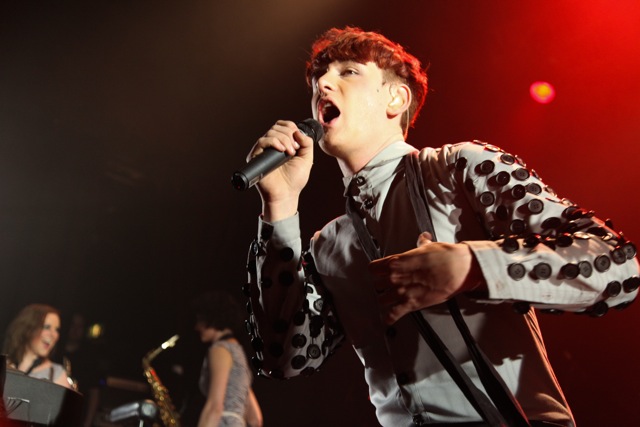In autumn last year, a graphic-based meme that mapped last.fm demographics swept round the internet for a couple of weeks. By visiting <a "href=http://playground.last.fm/demo/genderplot" target="out">this webpage you could see how your tastes aligned in terms of gender and age according to the artists you’d scrobbled for last.fm. It was interesting, for about five minutes, until you considered that information suggesting 30-year-old men make up the prime audience for The Bluetones was hardly going to cause the stir that writing ‘Jedi’ in the Census religion box did.
One of the most interesting things about this demographic tool, though, was what it revealed about Patrick Wolf fans; of all the artists I’ve seen plotted via this system, Wolf has very nearly the most female-biased audience – only Warpaint, Bat For Lashes, and PJ Harvey are close. No other male artist was anywhere near, and Patrick remains rooted to the bottom-left corner, even further out than Justin Bieber or The Jonas Brothers.
At gigs, of course, a young, mainly female audience is a good thing in many ways, not least of which being that it allows me – a 30-something man of no great height – to see comfortably over the heads of pretty much everyone in front. Everyone bar the errant, long-haired, tattooed, heavy-metal-looking guy, stripped to the waist and dancing like Dave Mustaine on heat at Bristol’s floating Thekla venue on Monday night, who knew the words to every song Patrick Wolf played, and who, if he scrobbled, would surely skew the demographic back towards the centre.
Patrick Wolf gigs are odd affairs. I’ve seen him throw a strop more than once, and turn in surly, taciturn performances that would endear him to no one. But I also saw him turn the London Palladium into a delirious, flamboyant rave at the tail-end of 2009, and hold a small arts centre crowd in the palm of his hand as he performed with just ukulele, voice and drums in 2005. On Monday he turned the Thekla into an interstellar glam-goth disco full of whirling 20-nothing girls and boys of indeterminate sexuality all desperate to touch his hand, but still showed enough control to slow the pace and pull out six-year-old B-sides written during the West Country sojourn that inspired his second album Wind In The Wires. It’s testament to the devotion of his fans that the B-sides were received as rapturously as his ‘hits’.
It’s this lack of genuine, bona-fide pop hits that confuses me most about Patrick Wolf. He is, hands down, the strongest live singer I have ever seen, and not averse to flitting from ukulele to harp to piano to violin to Telecaster and back again, too. His songs are strong, varied and soaked in his intriguing character, and he has a handful of full-on-awesome pop anthems (‘The Magic Position’, ‘Tristan’, ‘Accident And Emergency’, ‘Time Of My Life’, ‘Hard Times’ – the latter sadly absent tonight) that slay anything the likes of Mika could even dream of. Yet his demographic remains niche.
Why he has yet to escape this niche isn’t really a mystery, though. His predilection for diva-ish hissy fits onstage (though now overcome) has seen him physically haul an underperforming drummer from behind his kit and throw him offstage, and announce his (clearly failed) retirement from performing live before he was even 25. Combined with his often flamboyant attire and fondness for costume changes mid-set, his hard-to-pinpoint sexual identity (his upcoming album is dedicated to boyfriend William, but Wolf has been involved in long-term relationships with women in the past too), lyrics about cutting off his own penis, his assumed surname and a string of made-up family histories in early interviews, and there is a theatricality about Patrick Wolf’s entire persona which is at odds with the blokey landfill indie which has sucked up the opportunities for crossover success during the decade he has been active as a musician.
His refusal to bow to cliché or containment of any sort, musically or personally, has led to a bizarre accompaniment of collaborators (Eliza Carthy, Alec Empire, Marianne Faithful, Tilda Swinton). It’s also produced a suite of songs which vacillate from organic folk to judderingly synthetic techno to glam-pop just as erratically as his hair-colour swings from black to blonde to DayGlo red. Camp flamboyance is acceptable to mainstream culture when it’s predictable and handicapped by impotence (a la John Inman), but it’s easy to see how a strident and 6’4” violin-toting chameleon with a Scott-Walker-esque baritone might appeal to those seeking a superficially dangerous (but ultimately safe) transgressive obsession, but absolutely petrify anyone who fears their masculine identity may be threatened by mere association. On Monday’s evidence, the songs may now be strong enough to eclipse the persona in the ears of the unsure.
Patrick encored with recent single ‘The City’, an anthemic, joyous slice of glam pop that combines Kate Bush, Gerry Rafferty, and Duran Duran, and ended by delivering Sly & The Family Stone style salutations for his band. He’d started the gig in a Where-The-Wild-Things-Are-esque black wolf cowl with a song nobody knew, seemingly shy and misanthropic, and ended up with the entire crowd feeling on top of the evening together. He’s a contrary sod, Mr. Wolf. The forthcoming Lupercalia promises to be something special. Hopefully more than just the bottom-left-hand corner of the demographic map will appreciate it.



